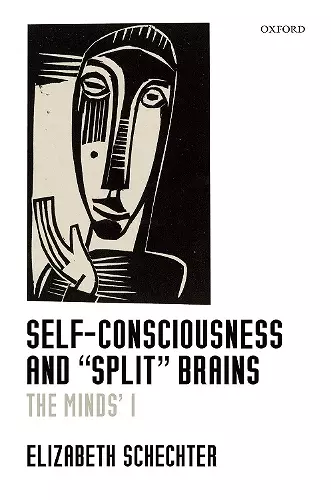Self-Consciousness and "Split" Brains
The Minds' I
Format:Hardback
Publisher:Oxford University Press
Published:14th Jun '18
Currently unavailable, and unfortunately no date known when it will be back

Exploring the experiences of split-brain subjects, Self-Consciousness and 'Split' Brains examines the duality of consciousness and identity within a single individual.
In Self-Consciousness and 'Split' Brains, Elizabeth Schechter delves into the complexities of consciousness as experienced by individuals who have undergone a surgical procedure to sever the corpus callosum, the bridge connecting the two hemispheres of the brain. This operation, primarily performed to treat severe epilepsy, results in what are known as split-brain subjects. Schechter posits that these individuals possess two distinct minds, each with its own stream of consciousness and intentionality, yet they still function as a single entity. This duality raises profound questions about the nature of identity and the essence of being human.
The book navigates the philosophical implications of having two operational centers of consciousness within one body. As Schechter explores the behaviors and experiences of split-brain subjects, she highlights the tension between the duality intuition—suggesting that they are composed of two separate minds—and the unity intuition, which asserts that they remain one person. Through various examples and thought experiments, the author illustrates how each hemisphere can exhibit independent thought and action, complicating our understanding of self and consciousness.
Ultimately, Self-Consciousness and 'Split' Brains invites readers to reconsider the nature of self-awareness and the intricate relationship between mind and body. By examining how self-consciousness shapes our identity, Schechter provides a compelling argument for recognizing the complexity of human experience, even in cases where the brain's structure is altered. This exploration not only challenges our assumptions about consciousness but also encourages a deeper understanding of what it means to be a singular person in a multifaceted world.
Schechter has written an exceptionally good book. Its particular virtues are the care and rigor with which arguments are developed. . . . Schechter makes use of a considerable amount of neurobiological detail, not all of which is made accessible to the non-expert -- this is as much a cognitive science book as a philosophy book . . . Schechter's writing is very appealing -- deft and stylish, in an understated way. This may help keep you going as you make your way through a lot of argument. The book seems to me an exemplary piece of naturalistic philosophy of mind . . . a detailed, careful attempt to get to the bottom of the way the human split-brain phenomenon actually is. The result is a very valuable book indeed. * Peter Godfrey-Smith, Notre Dame Philosophical Reviews *
Moving seamlessly between philosophy, psychology and neuroscience, Self-Consciousness and 'Split' Brains is a rich and wonderfully stimulating account of the commissurotomy syndrome. This is required reading for anyone who wishes to understand the self and the ties that unify consciousness, embodiment, and agency. * Tim Bayne, author of The Unity of Consciousness *
Schechter's book illustrates the best kind of philosophy of mind: careful philosophical analysis coupled to penetrating engagement with empirical work. Her discussion of the split-brain phenomenon illuminates the individuation of minds, the unity of consciousness, and the nature of agents and persons. The book will richly reward careful reading. * Wayne Wu, Center for the Neural Basis of Cognition, Carnegie Mellon University *
Split brains have puzzled psychologists and neuroscientists since the first operations. Schechter has mastered the massive literature and argued for profound lessons for the philosophy of mind and action. Inquiring minds will be enthralled. * Walter Sinnott-Armstrong, Department of Philosophy and the Kenan Institute for Ethics, Duke University *
ISBN: 9780198809654
Dimensions: 242mm x 164mm x 25mm
Weight: 636g
312 pages